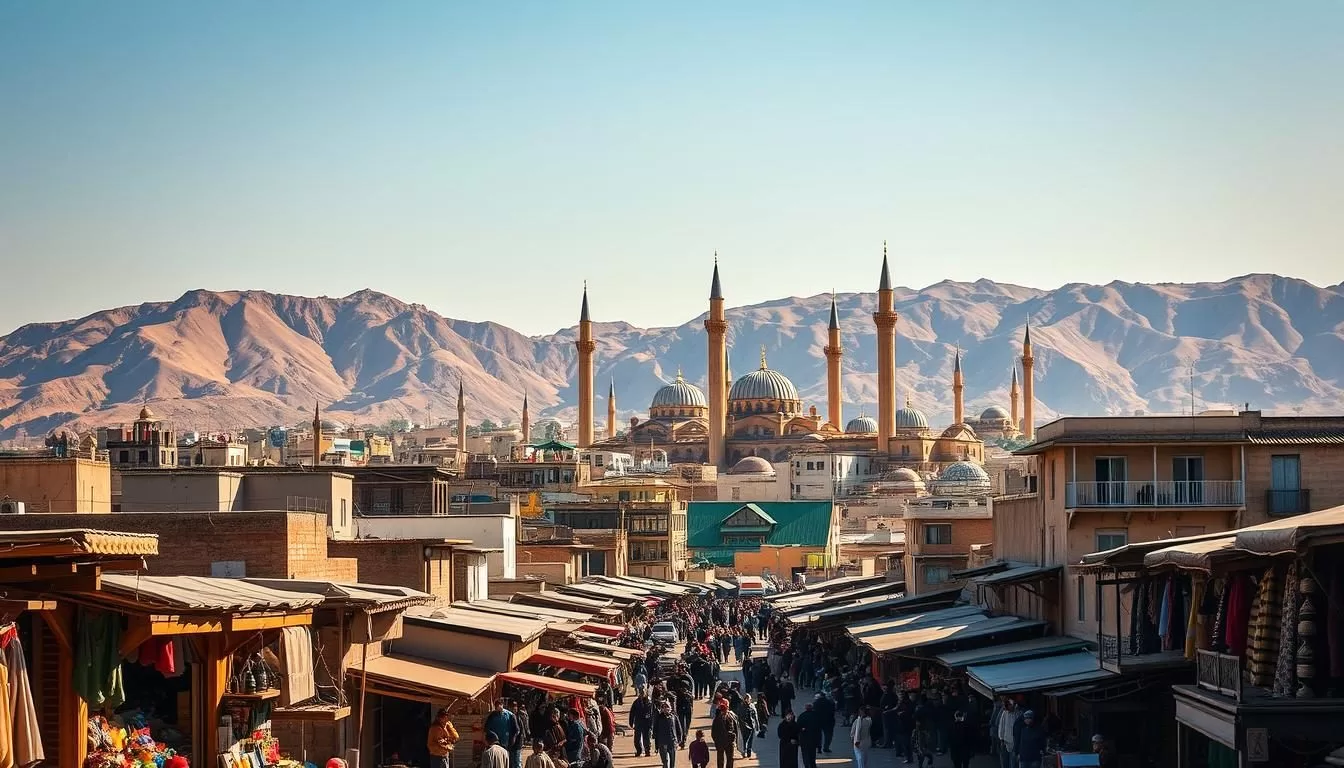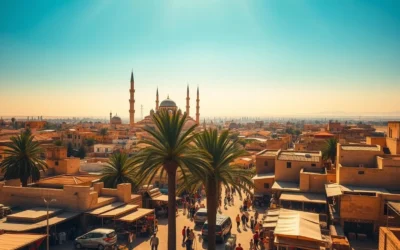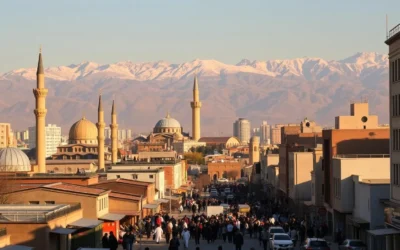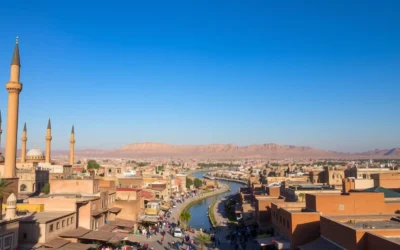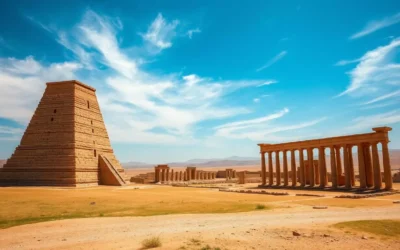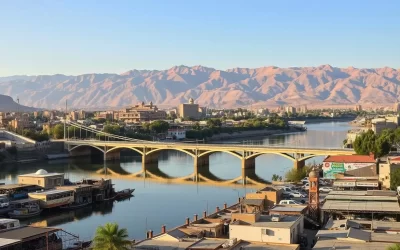✓ Accommodations✓ Flights✓ Rental Cars
Discover a place where ancient history meets vibrant modern culture. Kirkuk, a city with over 5,000 years of history, offers a unique blend of heritage and contemporary life. From its strategic role as an administrative center to its diverse cultural influences, this destination is a treasure trove for travelers.
Spring and fall are the ideal times to visit, with mild weather perfect for exploring. Whether you’re taking a private taxi or a shared car, the journey from nearby cities like Erbil is convenient and scenic. Once there, you’ll find a range of accommodations, from international hotels to budget-friendly options, ensuring a comfortable stay.
Immerse yourself in the city’s rich past by visiting landmarks like the Kirkuk Citadel, which showcases a mix of architectural styles. Don’t miss the bustling Qaysari Bazaar, where you can shop for local goods and savor traditional dishes like Masgouf. This guide will help you plan a trip that balances safety, affordability, and adventure.
Discovering Kirkuk: An Introduction to a Historic Gem
Step into a city where history breathes through every street. This destination has been a crossroads of civilizations for over 5,000 years, making it a unique place to explore. From its ancient roots to its modern vibrancy, it offers a rich tapestry of culture and heritage.
Understanding Kirkuk’s Unique Place in Iraq
Located in the heart of the region, this city has long been a strategic hub. Its geographical position has shaped its history, making it a melting pot of cultures and traditions. Over the centuries, it has evolved from an ancient settlement to a bustling urban center, blending the old with the new.
Today, you’ll find a mix of architectural styles, from the towering minarets of the Grand Mosque to the ancient walls of the Red Church. These landmarks tell the story of a place that has witnessed the rise and fall of empires.
Why Kirkuk Should Be on Your Travel List
For independent travelers, this destination offers an authentic experience. Wander through the Qaysari Bazaar, where you can shop for traditional crafts and spices. The lively atmosphere and welcoming locals make it a must-visit spot.
Don’t miss the Kirkuk Citadel, a testament to the city’s enduring legacy. Its ancient walls and panoramic views provide a glimpse into the past. Whether you’re exploring historic sites or savoring local cuisine, every moment here is a journey through time.
Plan your trip during the mild spring or fall seasons for the best weather. With its rich history and vibrant culture, this city promises an unforgettable adventure.
Kirkuk, Iraq: Best Things to Do – Top Picks
Uncover the charm of a city where history and culture intertwine. From ancient landmarks to bustling markets, this place offers a variety of activities that cater to every traveler’s interests.
Start your journey at the iconic Kirkuk Citadel, a testament to the city’s rich history. Wander through its ancient walls and enjoy panoramic views of the surrounding area. For a deeper dive into the past, visit the Qishla, a historic building that reflects the Ottoman influence on the region.
No trip is complete without exploring the vibrant Qaysari Bazaar. Here, you can shop for traditional crafts, spices, and souvenirs while soaking in the lively atmosphere. It’s a perfect spot to experience the local way of life and connect with the community.
For those who prefer a more relaxed pace, take a stroll through the city’s streets. Admire the blend of architectural styles, from mosques to historic houses, that tell the story of a place shaped by centuries of cultural exchange.
Getting around is easy with options like private taxis or shared cars, ensuring you can explore every corner of the city comfortably. Whether you’re here for a day or a week, these top picks will make your trip unforgettable.
Exploring the Ancient Citadel and Ottoman Heritage
Step back in time and explore the ancient citadel, a symbol of resilience and history. This iconic place has stood for centuries, witnessing the rise and fall of empires. Its fortified walls and towering gateways tell stories of a city shaped by countless cultures and rulers.
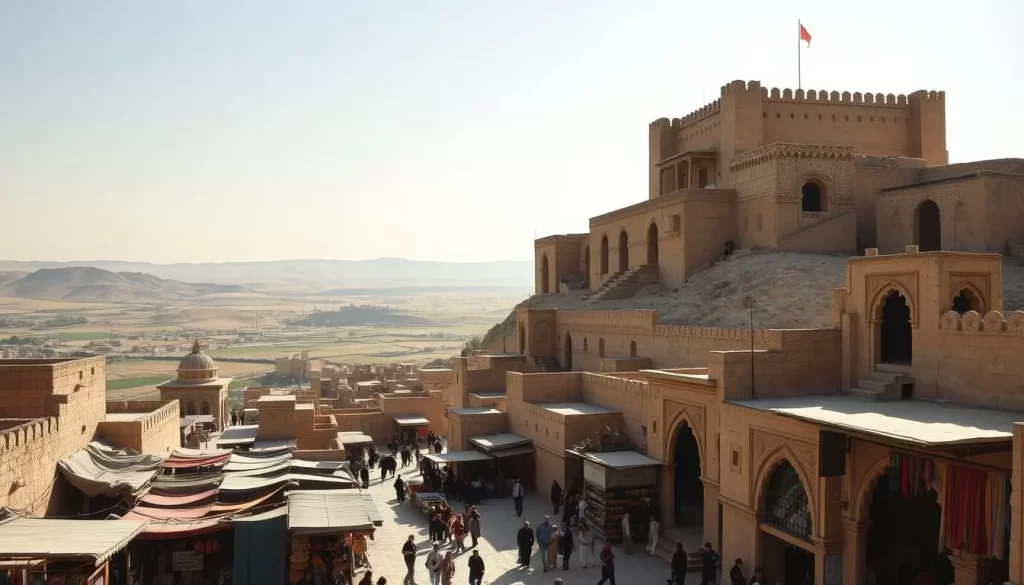
The History Behind Kirkuk’s Citadel
The citadel has been a strategic stronghold for over 5,000 years. It served as a military base, a royal residence, and a cultural hub. Its layered history reflects the influence of Assyrians, Persians, and Ottomans.
Today, it stands as a testament to the city’s enduring legacy. Visitors can walk through its ancient pathways and imagine the lives of those who once called this place home.
Architectural Influences from the Ottoman Era
During the Ottoman period, the citadel underwent significant changes. The Ottomans added fortified walls, gateways, and intricate designs that blended their style with local traditions.
Key features like the south-facing gate, built in the 1860s, showcase this fusion. The citadel’s buildings and structures remain a vivid reminder of the Ottoman impact on the region.
For a deeper experience, consider joining a guided tour. These tours provide fascinating insights into the citadel’s history and architecture. Early mornings or late afternoons are the best times to visit, offering stunning views and cooler weather.
| Feature | Description |
|---|---|
| Fortified Walls | Built for defense, these walls have protected the citadel for centuries. |
| South-Facing Gate | Constructed in the 1860s, it reflects Ottoman architectural style. |
| Panoramic Views | Offers breathtaking views of the surrounding area. |
Experiencing the Bustling Local Markets and Bazaars
Dive into the lively heart of the city’s markets and bazaars. These vibrant hubs are a feast for the senses, offering a mix of colors, scents, and sounds. Here, you’ll find everything from traditional crafts to aromatic spices, making it a must-visit place for any traveler.
Whether you’re shopping for unique souvenirs or simply soaking in the atmosphere, the markets provide an authentic experience. The friendly vendors and bustling crowds create a welcoming environment that’s hard to resist.
Shopping for Traditional Crafts and Spices
One of the highlights of visiting these markets is the chance to shop for traditional crafts. From handwoven textiles to intricate jewelry, each item tells a story of the region’s rich history and culture.
Spices are another treasure you’ll find here. The aroma of cumin, turmeric, and saffron fills the air, inviting you to explore. These spices are not only flavorful but also a great way to bring a piece of your trip back home.
Tips for Navigating Kirkuk’s Bazaars
Navigating the bustling bazaars can be overwhelming, but with a few tips, you’ll feel right at home. Start by arriving early to avoid the crowds and get the best selection of goods.
Bargaining is a common practice here, so don’t hesitate to negotiate prices. It’s a fun way to interact with local vendors and often leads to better deals. Keep small bills handy for smoother transactions.
Lastly, take your time to explore. Each stall offers something unique, and you never know what hidden gems you might discover. Whether it’s a beautifully crafted rug or a rare spice blend, the markets are full of surprises.
| Item | Price Range |
|---|---|
| Handwoven Textiles | $5 – $50 |
| Spices and Herbs | $2 – $10 |
| Handcrafted Jewelry | $10 – $100 |
| Wooden Carvings | $8 – $30 |
Admiring Iconic Landmarks and Historical Buildings
Walk through streets lined with centuries-old structures. Each building tells a story of the city’s rich past and cultural exchange. From military strongholds to roadside marvels, these landmarks are a testament to the region’s enduring legacy.
Visiting the Qishla and Historic Roadside Structures
The Qishla, once central to Ottoman military operations, stands as a symbol of the city’s strategic importance. Its robust design and historical significance make it a must-visit place for any traveler.
Along the roads, you’ll find buildings that reflect centuries of cultural exchange. These structures showcase a blend of architectural styles, from Ottoman to local designs. Preservation efforts ensure they remain a vital part of the city’s identity.
For the best experience, visit these landmarks early in the morning or late afternoon. This timing offers cooler weather and fewer crowds. Consider hiring a private taxi for convenient travel between sites.
Whether you’re a history enthusiast or a casual traveler, these landmarks provide a unique glimpse into the city’s past. Take your time to explore and appreciate the stories they hold.
Uncovering Kirkuk’s Rich Cultural Layers
Experience the vibrant cultural mosaic of a historic city. This place is a melting pot of indigenous, Arab, and Ottoman influences, creating a unique blend that shapes everyday life. From traditional art to community events, every corner tells a story of cultural exchange.
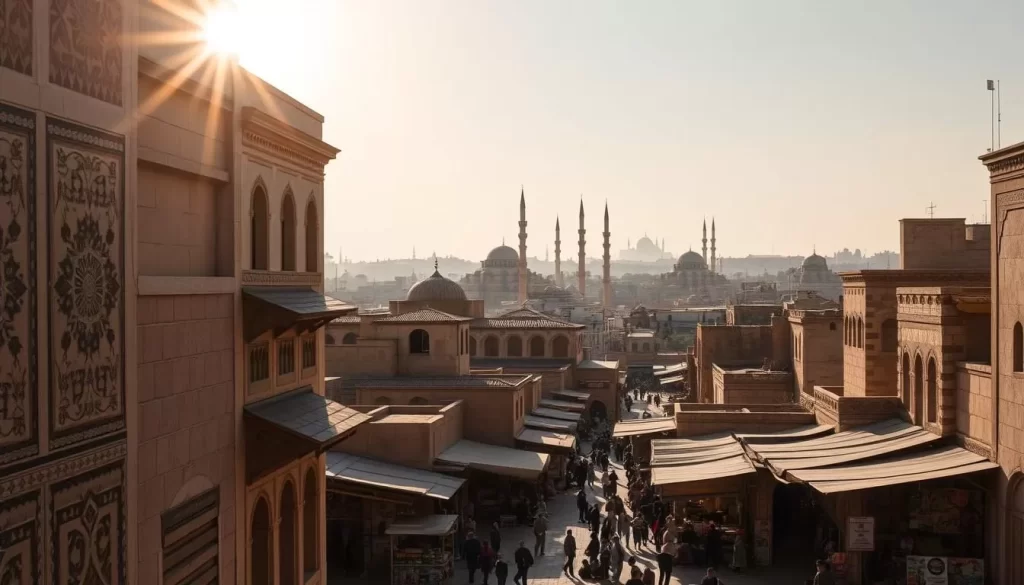
One of the best ways to explore this diversity is by visiting the local market. Here, you’ll find handmade crafts, spices, and textiles that reflect the region’s heritage. The bustling atmosphere and friendly vendors make it a must-visit spot for any traveler.
Don’t miss the chance to interact with residents. Their stories and traditions offer a deeper understanding of the city’s cultural layers. Whether you’re sipping tea in a cozy café or attending a community event, these moments add depth to your trip.
For a more structured experience, visit cultural institutions like the local museum. These places showcase artifacts and exhibits that highlight the region’s history and artistic achievements. It’s a great way to connect with the past while appreciating the present.
| Cultural Highlight | Description |
|---|---|
| Traditional Crafts | Handwoven textiles and intricate jewelry reflect local artistry. |
| Community Events | Festivals and gatherings celebrate the city’s diverse heritage. |
| Historic Buildings | Architectural styles blend Ottoman and indigenous designs. |
By immersing yourself in these cultural layers, you’ll gain a richer understanding of this fascinating place. Whether you’re exploring a mosque, strolling through a market, or chatting with locals, every moment adds to your travel experience.
Navigating Kirkuk’s Streets: Transportation and Taxi Tips
Getting around the city efficiently is key to making the most of your trip. Whether you’re exploring historic sites or bustling markets, understanding your transportation options can save you time and hassle. Here’s a guide to help you navigate the streets with ease.
Using Public Transport and Local Taxis
Public buses are a budget-friendly option for getting around. They cover major routes and are a great way to experience local life. However, schedules can be unpredictable, so plan extra time for your journeys.
For more flexibility, consider hiring a taxi. Negotiating fares upfront is common practice, and it’s wise to confirm the cost before starting your ride. Shared taxis are also available and can be a cost-effective option for shorter distances.
Tips for Safe and Efficient Travel
When using a taxi, choose licensed drivers or those recommended by your hotel. This ensures a safer and more reliable experience. Always keep small bills handy for smoother transactions.
Navigating military checkpoints requires patience. Have your identification ready and follow instructions from officials. Staying calm and cooperative will help you move through these areas more quickly.
For longer distances, shared taxis are a popular choice. For example, the journey from Erbil to Kirkuk takes about 2.5 hours and costs around 15,000 IQD. This is a convenient option for travelers looking to explore nearby areas.
By following these tips, you’ll be able to navigate the city with confidence. Whether you’re hopping on a bus or hailing a taxi, these strategies will make your travel smoother and more enjoyable.
Day Trips and Excursions from Kirkuk
Expand your journey with exciting day trips from the city. Whether you’re drawn to historic sites or natural wonders, the surrounding area offers plenty of options for a memorable day out. Here’s how to make the most of your trip.
Itinerary Highlights for a One-Day Adventure
Start your day with a visit to the ancient city of Erbil, just a 2.5-hour drive away. Explore the iconic Citadel, believed to have been inhabited for over 8,000 years. Afterward, head to the bustling bazaar to shop for traditional crafts and spices.
For nature lovers, a trip to the Amadiya region is a must. Located 1,200 meters above sea level, this scenic place offers breathtaking views and winding mountain roads. Spend the afternoon hiking or simply soaking in the serene atmosphere.
Transportation Options and Tips
Getting to these destinations is easy with taxi or bus services. Shared taxis are a cost-effective option, with fares ranging from $7 to $12. For a more comfortable experience, consider hiring a private taxi or driver.
- Taxi: Convenient and flexible, ideal for small groups.
- Bus: Budget-friendly, but schedules may vary.
- Private Car: Offers freedom to explore at your own pace.
Plan your trip during spring or fall for the best weather. These seasons provide mild temperatures, perfect for outdoor activities. With a flexible schedule, you can enjoy a mix of guided tours and self-guided exploration.
Savoring Local Cuisine and Traditional Flavors
Indulge in the rich flavors of a city where every bite tells a story. The culinary scene here is a vibrant mix of traditional recipes and modern twists, offering a unique way to connect with the local culture. From savory street food to hearty meals, the food here is a highlight of any trip.
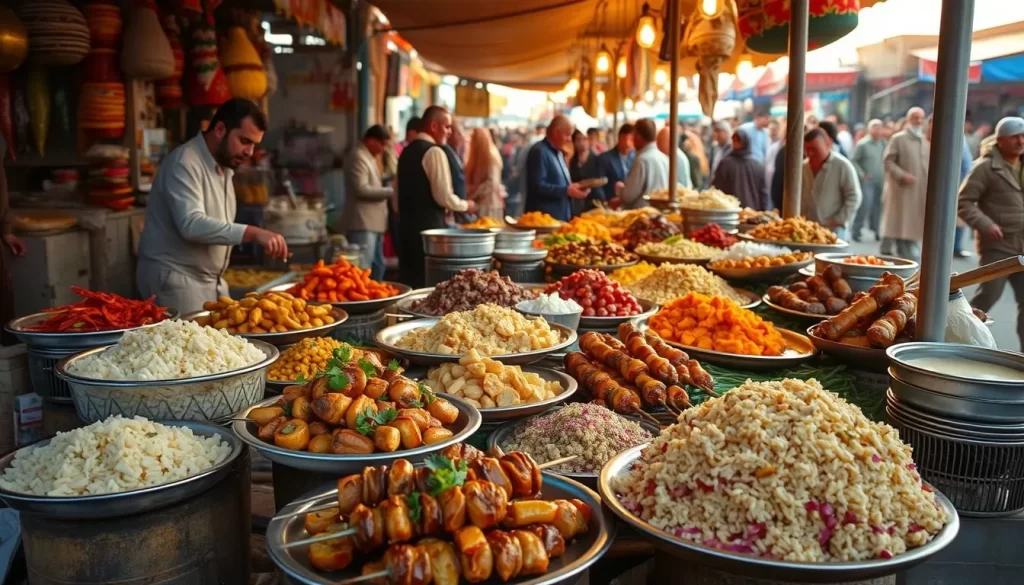
Must-Try Dishes and Street Food Finds
Start your culinary adventure with local favorites like Masgouf, a grilled fish dish seasoned with spices and olive oil. Another must-try is Dolma, stuffed vegetables filled with rice, herbs, and meat. These dishes are staples in the city and can be found in bustling markets or small street stalls.
For a quick snack, try Sambusa, a savory pastry filled with spiced meat or vegetables. Pair it with a cup of sweet, aromatic tea for a complete experience. Street food is not only delicious but also a great way to immerse yourself in the local way of life.
Restaurant Recommendations for Authentic Meals
For a sit-down meal, visit Al-Masgouf Restaurant, known for its perfectly grilled fish and warm hospitality. Another great spot is Al-Dar, where you can enjoy traditional dishes in a cozy setting. These restaurants offer an authentic taste of the region’s culinary heritage.
If you’re looking for a more casual experience, head to the Qaysari Bazaar. Here, you’ll find small eateries serving everything from kebabs to falafel. The lively atmosphere and friendly vendors make it a must-visit place.
| Restaurant | Specialty | Location |
|---|---|---|
| Al-Masgouf Restaurant | Grilled Fish | City Center |
| Al-Dar | Traditional Dishes | Near the Citadel |
| Qaysari Bazaar Eateries | Street Food | Market Area |
Exploring the food scene is a delicious way to enhance your travel experience. Whether you’re dining in a restaurant or grabbing a quick bite from a street vendor, every meal is a chance to connect with the local culture.
Immersing Yourself in Kirkuk’s Deep History
Delve into the heart of a city where history comes alive through its museums and cultural institutions. These places offer a unique way to connect with the region’s rich past and diverse heritage. From ancient artifacts to Ottoman-era exhibits, every visit is a journey through time.
Museums and Cultural Institutions You Can’t Miss
The Kirkuk Museum is a must-visit place for anyone interested in the region’s history. It houses artifacts from various civilizations, including Mesopotamian tablets and Islamic art. These exhibits provide a glimpse into the city’s role as a crossroads of cultures over the centuries.
Another key spot is the Mustafa Pasha Kervansaray, a historic caravanserai that once served travelers on the Silk Road. Its architecture reflects the Ottoman influence, making it a fascinating place to explore.
Why These Visits Enrich Your Understanding
Exploring these institutions offers more than just a trip through history. It provides a deeper understanding of the local culture and the forces that shaped the region. Each artifact and exhibit tells a story, connecting you to the city’s enduring legacy.
For a seamless experience, consider hiring a private taxi to navigate between these sites. This ensures you can focus on the history without worrying about transportation.
| Institution | Highlights | Operating Hours |
|---|---|---|
| Kirkuk Museum | Mesopotamian artifacts, Islamic art | 9 AM – 5 PM |
| Mustafa Pasha Kervansaray | Ottoman architecture, Silk Road history | 10 AM – 4 PM |
Incorporating these visits into your travel itinerary is a way to enrich your understanding of the region. Whether you’re a history enthusiast or a casual traveler, these cultural institutions offer something for everyone.
For more insights into the region’s cultural and historical context, refer to this detailed report on Iraq’s diverse heritage.
Staying Safe: Practical Travel Tips for Iraq
Ensuring your safety while exploring a new destination is essential for a memorable trip. When traveling independently, it’s important to stay informed and prepared. Here are some practical tips to help you navigate safely and enjoy your journey.
Choosing Reputable Transportation
When using taxi services, always opt for verified providers. In Iraqi Kurdistan, services like Careem are recommended for their safety and standard pricing. Avoid unmarked vehicles and negotiate fares upfront to prevent misunderstandings.
Avoiding Risky Areas
While most parts of the city are safe, certain areas near borders, such as those with Turkey and Iran, should be avoided due to potential conflicts. Stick to well-known tourist spots and consult your hotel or guide for advice on safe locations.
Staying Informed
Keep up with local news and travel advisories to stay aware of any potential risks. Awareness of current events can help you make informed decisions about your trip and avoid unexpected issues.
Securing Personal Belongings
In crowded areas like markets or bazaars, keep your belongings close. Use a money belt or a secure bag to protect your valuables. Being cautious can prevent theft and ensure a stress-free experience.
Preparation is Key
Carry copies of important documents like your passport and travel insurance. Have emergency contacts saved and know the location of your country’s embassy. These small steps can make a big difference in case of unexpected situations.
| Safety Tip | Details |
|---|---|
| Transportation | Use verified taxi services like Careem in Iraqi Kurdistan. |
| Avoid Risky Areas | Stay away from border regions with Turkey and Iran. |
| Stay Informed | Monitor local news and travel advisories regularly. |
| Secure Belongings | Use a money belt or secure bag in crowded areas. |
| Preparation | Carry copies of important documents and emergency contacts. |
By following these tips, you can ensure a safe and enjoyable trip. For more information on traveling in the region, check out this guide to Iraqi Kurdistan.
Seasonal Highlights: Best Time to Visit Kirkuk
Experience the perfect blend of mild weather and cultural richness during your visit. Timing your trip to this historic city can make all the difference in your travel experience. Spring and fall are the most popular seasons, offering comfortable temperatures and vibrant local events.
Weather Insights and Ideal Travel Periods
Spring, from March to May, brings mild weather with temperatures ranging from 60°F to 80°F. This is an ideal time to explore outdoor attractions like the ancient citadel and bustling markets. Fall, from September to November, offers similar conditions, making it another great option for travelers.
Summer can be hot, with temperatures often exceeding 100°F. However, early mornings and late evenings are still pleasant for sightseeing. Winter, from December to February, is cooler but manageable, with temperatures averaging 40°F to 60°F. This season is perfect for those who prefer fewer tourists and a more relaxed pace.
Planning Your Trip Around Seasonal Highlights
To make the most of your visit, align your trip with local events and festivals. Spring is a great time to witness traditional celebrations, while fall offers harvest festivals and cultural performances. These events provide a unique way to connect with the local community.
For a seamless experience, consider hiring a private taxi to navigate the city comfortably. This allows you to explore at your own pace and avoid the heat during peak summer hours. Pack light layers for spring and fall, and bring sunscreen and a hat for summer visits.
Whether you’re here for a short day trip or an extended stay, planning around the seasons ensures a memorable and enjoyable travel experience. For more insights on sustainable travel, check out this study on renewable energy and its benefits for the tourism industry.
Planning Your Trip: Practical Information and Costs
Planning your trip to this historic destination requires careful preparation and attention to detail. From transportation to accommodations, understanding the costs and logistics will help you make the most of your journey. Here’s a comprehensive guide to ensure a smooth and enjoyable experience.
Daily expenses can vary depending on your travel style. Budget travelers can expect to spend around $35 USD per day, which includes simple meals like shawarma and stays in budget hotels. For mid-range travelers, costs rise to $80+ USD per day, covering 3-star hotels and restaurant meals.
Transportation is a key part of your budget. Shared taxis are a cost-effective option, with fares ranging from $4 to $25 USD for trips between major destinations. For more flexibility, hiring a private taxi is a convenient choice, especially for exploring the city at your own pace.
Accommodation prices vary widely. Budget hotels with dorm rooms cost between 12,000 to 18,000 ID per night, while double rooms in mid-range hotels range from 35,000 to 50,000 ID. Booking in advance can help secure better rates and ensure availability during peak travel seasons.
“Traveling is not just about seeing new places; it’s about experiencing them in a way that fits your budget and style.”
When it comes to food, local markets and street stalls offer affordable and delicious options. A shawarma sandwich costs between 800 to 1,400 ID, while roasted chicken and salad plates range from 7,000 to 12,000 ID. For a more upscale dining experience, expect to spend around $25 USD per person at a restaurant.
Here’s a breakdown of typical daily costs:
| Expense | Cost (USD) |
|---|---|
| Budget Accommodation | $10 – $15 |
| Mid-Range Accommodation | $30 – $50 |
| Street Food | $1 – $3 |
| Restaurant Meal | $10 – $25 |
| Shared Taxi | $4 – $25 |
Travel formalities are another important aspect. Ensure you have the necessary visa, which costs $160 and is valid for 60 days. Carry copies of important documents and be aware of local laws, such as the requirement to declare currency over $10,000 upon entry or exit.
By planning ahead and budgeting wisely, you can enjoy a stress-free and memorable trip. Whether you’re exploring historic sites or savoring local cuisine, these tips will help you make the most of your journey.
Connecting With Locals and Authentic Experiences
Engaging with the community is one of the most rewarding aspects of travel. It’s a way to gain deeper insights into the culture and create lasting memories. When you connect with locals, you uncover hidden gems and experiences that guidebooks often miss.
How to Engage with Local Communities
Start by being open and respectful. A simple greeting in the local language can go a long way. Ask questions about their traditions or favorite places in the city. This shows genuine interest and often leads to meaningful conversations.
Consider hiring a taxi driver who knows the area well. They can introduce you to lesser-known spots and share personal stories about the city. In Iraqi Kurdistan, for example, drivers often double as informal guides, offering unique perspectives.
Authentic Experiences to Seek Out
One of the best ways to connect is through food. Sharing a meal with a local family lets you experience traditional dishes like Masgouf or Tashreeb, which are staples in the region. These moments are not just about the food but also about the stories and traditions shared around the table.
Attending local festivals or events is another great way to immerse yourself. These gatherings are a celebration of culture and provide a chance to interact with the community in a relaxed setting.
Why Local Recommendations Matter
Locals often know the best spots that aren’t on the tourist map. Whether it’s a cozy café, a scenic viewpoint, or a quiet place to watch the sunset, their recommendations can transform your trip. Don’t hesitate to ask for advice—most people are happy to share their favorite places.
By putting aside preconceptions and embracing these interactions, you’ll create a travel experience that’s both authentic and unforgettable. Whether it’s a shared meal, a festival, or a casual chat, these moments enrich your journey in ways you’ll cherish for years.
Exploring Iraq Beyond Kirkuk
Venture beyond the familiar and explore the diverse landscapes surrounding your base. Using Kirkuk as a starting point, you can uncover nearby attractions that offer a mix of natural beauty, cultural richness, and historical depth. Whether you’re planning a day trip or an extended itinerary, the surrounding regions provide endless opportunities for discovery.
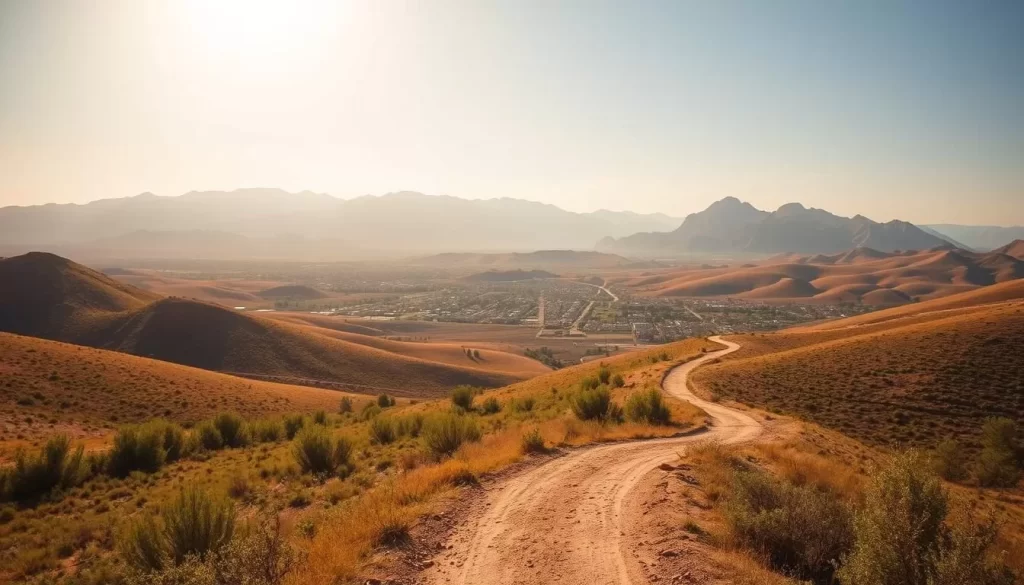
Nearby Attractions in Iraqi Kurdistan
Just a few hours away, you’ll find Erbil, the capital of Iraqi Kurdistan. Known for its UNESCO-listed citadel and vibrant bazaars, Erbil is a place where ancient history meets modern life. The journey takes about 2.5 hours by taxi, making it an ideal day trip.
Another must-visit is Sulaymaniyah, a city surrounded by mountains. It’s home to the Amna Suraka Museum, which offers insights into the region’s turbulent past. The drive from Kirkuk takes approximately 3 hours, and shared taxis are a cost-effective option.
Extended Itineraries for Deeper Exploration
For those with more time, consider a multi-day trip to Mosul. This historic city is rebuilding after years of conflict, and its landmarks, like the Al-Nuri Mosque, are slowly being restored. The journey takes about 4 hours by taxi, and you can stay overnight in a local hotel.
If you’re drawn to nature, head to the Zagros Mountains. These rugged peaks offer hiking trails and stunning views. The trip requires a bit more planning, but the experience is worth it. Shared taxis or hiring a driver are the best ways to reach this remote area.
Transportation Options and Tips
Getting around is straightforward with several options. Shared taxis are affordable, with fares ranging from $4 to $25 for trips between major destinations. For more flexibility, consider hiring a private taxi or driver. This allows you to explore at your own pace and avoid the hassle of public transport.
If you’re traveling to Erbil, a shared taxi costs around $7 per person for a 2.5-hour ride. For longer trips, like Mosul, expect to pay around $12 per person. Always confirm fares upfront to avoid surprises.
| Destination | Travel Time | Transportation Cost |
|---|---|---|
| Erbil | 2.5 hours | $7 per person |
| Sulaymaniyah | 3 hours | $8 per person |
| Mosul | 4 hours | $12 per person |
| Zagros Mountains | 5+ hours | Varies |
By using Kirkuk as a home base, you can easily explore the surrounding regions. Whether you’re interested in history, culture, or nature, these trips offer a well-rounded experience. For more insights into Erbil’s rich history and culture, check out our detailed guide.
Conclusion
Wrap up your journey with a deeper appreciation for this historic destination. From ancient landmarks to bustling markets, this city offers a blend of cultural richness and modern amenities. Whether you’re exploring by taxi or staying in a cozy hotel, every moment here is a chance to connect with its vibrant heritage.
Plan your trip with confidence, keeping safety and flexibility in mind. Engage with locals to uncover hidden gems and immerse yourself in authentic experiences. The complexities of its socio-political landscape add depth to your understanding, making your visit even more meaningful.
Take the time to savor every aspect of your adventure. This place invites you to explore, learn, and create memories that will last a lifetime. Start planning today and discover all it has to offer.
The above is subject to change.
Check back often to TRAVEL.COM for the latest travel tips and deals.
